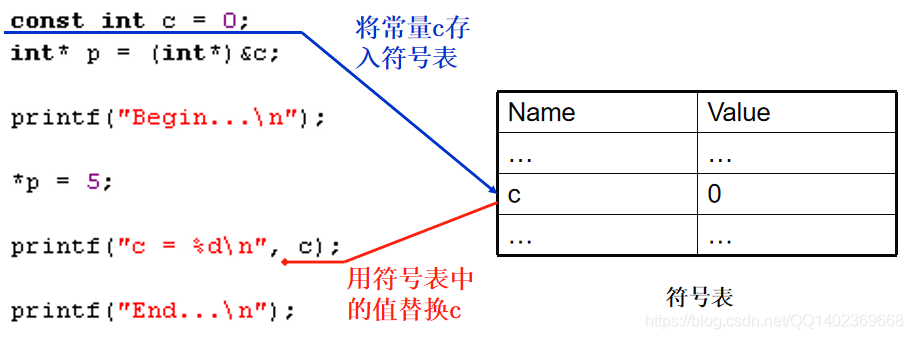文章目录
C语言中const:
在C语言中const修饰的变量是只读的,其本质还是变量
const修饰的变量会在内存占用空间
本质上const只对编译器有用,在运行时无用
—原来const不是真的常量—
#include <stdio.h>
#include <malloc.h>
int main()
{
const int cc = 1;
printf("%d\n", cc);
cc = 3; //error
printf("%d\n",cc);
return 0;
}
运行结果:

代码:
#include <stdio.h>
#include <malloc.h>
int main()
{
const int cc = 1;
int* p = (int*)&cc;
printf("%d\n", cc);
*p = 3;
printf("%d\n",cc);
return 0;
}
运行结果:

const修饰数组:
在C语言中const修饰的数组是只读的(类似const int cc,也会分配内存空间)
#include <stdio.h>
#include <malloc.h>
int main()
{
const int array[5] = {1,2,3,4,5};
array[0] = 8;
int i;
for(i=0; i<5; i++)
{
printf("%d\n",array[i]);
}
return 0;
}
运行结果:

const修饰指针:
const int* p; //p可变,p指向的内容不可变
int const* p; //p可变,p指向的内容不可变
int* const p; //p不可变,p指向的内容可变
const int* const p; //p和p指向的内容都不可变
口诀:
当const出现在 * 号左边时指针指向的数据为常量
当const出现在 * 后右边时指针本身为常量
const修饰函数参数和返回值:
const修饰函数参数表示在函数体内不希望改变参数的值
const修饰函数返回值表示返回值不可改变,多用于返回指针的情形
#include <stdio.h>
#include <malloc.h>
const int* func()
{
static int count;
count++;
return &count;
}
int main()
{
int i;
const int* p = func();
printf("%d\n",*p);
return 0;
}
运行结果:

C++中的const
#include <stdio.h>
#include <malloc.h>
int main()
{
const int c = 0;
int* p = (int*)&c;
*p = 5;
printf("c = %d\n",c);
return 0;
}
运行结果:

C++编译器对const常量的处理
当碰见常量声明时在符号表中放入常量
编译过程中若发现使用常量则直接以符号表中的值替换
编译过程中若发现对const使用了extern或者&操作符,则给对应的常量分配存储空间
注意:C++编译器虽然可能为const常量分配空间,但不会使用其存储空间中的值。
图示:

C++中的const是真正意义上的常量:
test.c
#include <stdio.h>
#include <malloc.h>
int main()
{
const int a =1;
const int b = 2;
int array[a+b] = {0}; //在C语言中const int a是只读变量,不是真正意义上的常量。
int i = 0;
for(i = 0; i<a+b; i++)
{
printf("array[%d] = %d\n",i,array[i]);
}
return 0;
}
运行结果:

test.cpp
#include <stdio.h>
#include <malloc.h>
int main()
{
const int a =1;
const int b = 2;
int array[a+b] = {0}; //相当于array[1+2] 在C++中const int a是真正意义上的常量。
int i = 0;
for(i = 0; i<a+b; i++)
{
printf("array[%d] = %d\n",i,array[i]);
}
return 0;
}
运行结果:

C++中的const和宏定义的区别:
经过上面的分析,感觉好像c++中的const和宏定义很像,他们两个有什么区别那?
const常量是由编译器处理的,提供类型检查和作用域检查
宏定义由预处理器处理,单纯的文本替换
宏定义代码:
#include <stdio.h>
#include <malloc.h>
void f()
{
#define a 3
// const int b = 4;
}
void g()
{
printf("a = %d\n",a);
// printf("b = %d\n",b);
}
int main()
{
f();
g();
return 0;
}
运行结果:

C++中的const常量代码:
#include <stdio.h>
#include <malloc.h>
void f()
{
// #define a 3
const int b = 4;
}
void g()
{
// printf("a = %d\n",a);
printf("b = %d\n",b);
}
int main()
{
f();
g();
return 0;
}
运行结果:

未完待续
涉及类和引用等c++的特性所用到const以后再添加,未完待续…